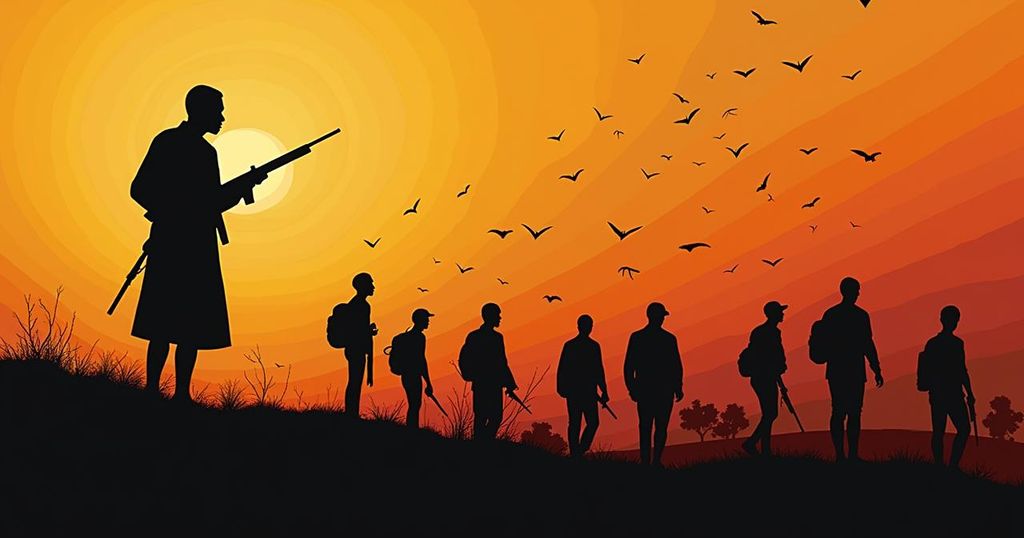Mali’s Coup: Catalyst for Regional Political Instability in West Africa
Since the coup in Mali in August 2020, over ten military takeovers have transpired in West and Central Africa, suggesting a potential trend toward military rule in response to governance and security crises. The Malian coup has prompted similar actions in Guinea, Burkina Faso, and Niger, resulting in significant regional instability, a pivot away from French influence towards Russian military support, and an erosion of democratic norms facilitated by inconsistent responses from ECOWAS.
Four years have passed since the military coup in Mali, which occurred on August 18, 2020, when a faction of soldiers forcibly displaced President Aboubakar Keita amidst widespread protests against his administration. This coup marked a significant turning point for West Africa, signaling the onset of a resurgence in military takeovers that had largely subsided in the region for the preceding eight years. Since this event, numerous coup attempts have transpired across West and Central Africa, igniting discussions on the sustainability of civilian governance and highlighting a possible trend towards military rule in response to worsening security and governance issues. Following the coup that removed Keita, Colonel Assimi Goita ascended to power, initially serving as the vice president in a joint civilian-military transitional government led by President Bah Ndaw. However, a power struggle erupted between Goita and Ndaw, culminating in another military coup on May 24, 2021, which solidified Goita’s hold on power. This pattern of military intervention has continued to reverberate throughout the region, with additional countries experiencing coup attempts, including Guinea, Burkina Faso, and Niger. In particular, the coup in Guinea ousted President Alpha Conde in September 2021, driven by public discontent over his attempts to prolong his presidency. Burkina Faso soon followed suit, where escalating violence from armed groups led to the deposition of President Roch Marc Christian Kabore in January 2022, and again later in September 2022. Niger’s political instability culminated in a coup in July 2023, adding to the trend seen throughout the region. Furthermore, the dynamics shifted as countries objected to the historical influence of France, prompting military regimes in Mali, Burkina Faso, and Niger to turn to Russia for military support. This strategic pivot coincided with a broader regional sentiment against foreign interference, particularly from former colonial powers. However, rising violence and insecurity have characterized the post-coup landscapes, raising concerns regarding the efficacy of military rule amid accusations of human rights violations by the authorities, including Wagner Group mercenaries in the region. The Economic Community of West African States (ECOWAS) has struggled to maintain a unified response to these upheavals, failing to deter further coups and allowing a deterioration in governance. Critics argue that ECOWAS’s inconsistent reactions to military takeovers have emboldened coup leaders and undermined democratic norms. As a result, the future trajectory of governance in West Africa remains uncertain, with ongoing conflicts and governmental instability eroding public trust and prompting a significant decline in civilian rule in the region.
The initial coup in Mali in August 2020 served as a catalyst for a resurgence of military takeovers in West Africa, an area previously marked by a semblance of political stability following its liberation from colonialism. Prior to the coup, Mali had experienced relative calm for eight years, but the coup led by Colonel Assimi Goita on the pretext of addressing governance failures reverberated throughout the region. Consequently, several nations have followed suit, instituting military rule as a supposed remedy to instability generated by armed conflicts and political discontent, often exacerbated by international geopolitical shifts and dissatisfaction with historical colonial powers. Expert opinions indicate a return to a tumultuous era reminiscent of previous decades rife with military coups, marking a significant evolution in West African political landscapes. This series of coups has sparked widespread concerns regarding the prevailing armed violence, widespread human rights violations, and regional instability as military regimes grapple with issues of legitimacy and governance. Now, both national and international observers are vigilant about the ramifications of this governance shift and its implications for security, human rights, and regional cooperation.
The events following the Malian coup in 2020 have indeed charted a troubling trajectory for West Africa, with an influx of military coups resulting in heightened instability and violence. The wave of coups reflects not only a reaction to local governance failures but also broader regional and international trends, including a shift away from former colonial influences and towards alternative alliances. As military leaders navigate the complexities of governance and insurgency, the future of democracy in the region faces significant challenges, necessitating a reevaluation of both local and international strategies for maintaining stability and peace.
Original Source: www.aljazeera.com




Post Comment